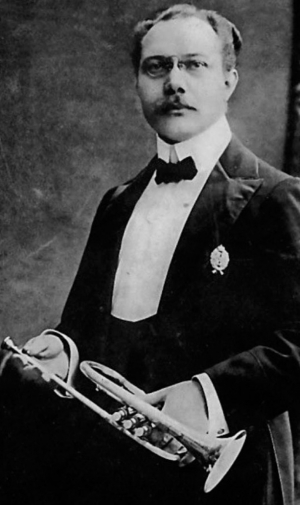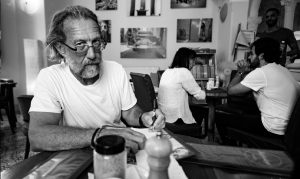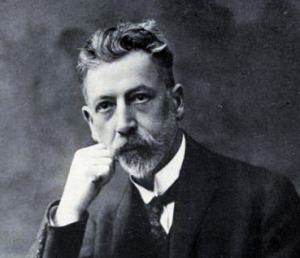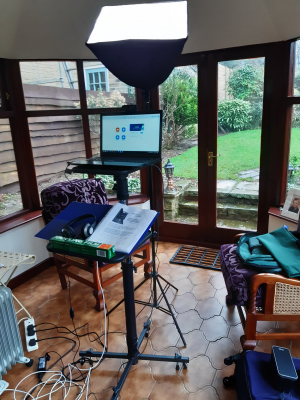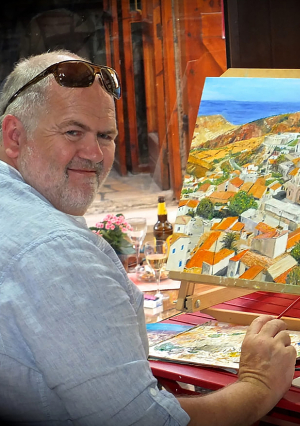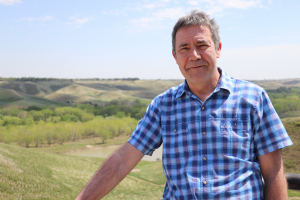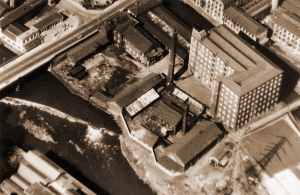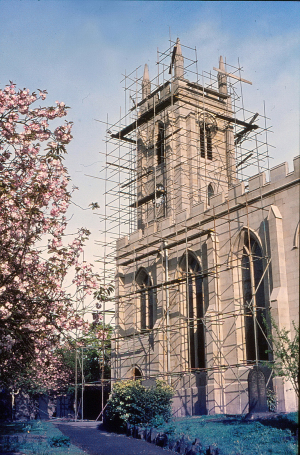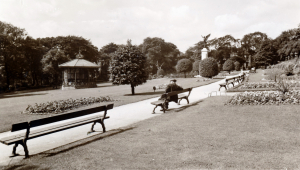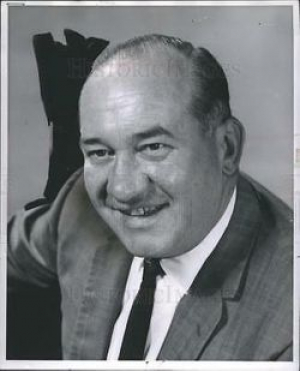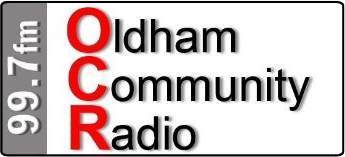
Chris Helme
Oskar Böhme (February 24, 1870 – October 23, 1938) was a German composer and trumpeter.
The son of Wilhelm Böhme, also a trumpeter, was born in Potschappel, a small town near Dresden, Germany, which is now part of Freital. For much of his early career, after studying trumpet and composition in the Leipzig Conservatory of Music until graduating in 1888, it is unknown what his musical activities were, though it is probable he played in smaller orchestras around Germany.
From 1894-1896, he played in the Budapest Opera Orchestra and then moved to St. Petersburg, Russia, in 1897. He played cornet for 24 years in the Mariinsky Theatre, turned to teaching at a music school on Vasilevskiy Island in St. Petersburg for nine further years, from 1921-1930, and then returned to opera with the Leningrad Drama Theatre until 1934.
In 1934, however, the Great Terror began under Joseph Stalin and in 1936 a committee was established to oversee the arts in Soviet Russia. According to its anti-foreign policies, Böhme was exiled to Orenburg on account of his German heritage. It is said that he died there in 1938, though he was also said to be seen working on the Turkmenistan Canal in 1941.
He composed 46 known works, of which his Trompeten Sextett in E-flat minor for brass sextet and Trumpet Concerto (Op. 18) are the best known. He wrote in the Romantic style, primarily works for trumpet and brass instruments in general. While, because of his exile, his works were neglected during the Stalinist era, Böhme is increasingly being rediscovered.
We are featuring his most popular cornet solo Concerto in F Minor on this week’s show.
Leaving third-formers unattended on a double-decker bus heading for cricket practice is never a good idea. We were upstairs, rocking the Leyland, intent on tipping her over. The entire class of third-formers running from side to side together, and we had a good sway going when, to our glee, someone spotted Eric, the ‘mad’ maths master strutting across the Rastrick Grammar School yard. So, a long cry went up… ‘Errrricccc!... Errrrricccc!’ as we ran side to side. I relish the memory of Mr. Nichols gripping his cape, gritting his teeth as he stormed up the stairs, uttering his delicious invectives -’Insolent bounders!... Whippersnappers!... Snidey shodhorns!’ - as he lashed about with flailing arms.
Julianus Marie August De Boeck (May 9, 1865 in Merchtem, Belgium – October 9, 1937 in Merchtem) was a Flemish composer, organist, and music pedagogue. He was the son of organist and director Florentinus (Flor) De Boeck (1826-1892). From 1880 he studied organ at the Royal Conservatory of Brussels under Alphonse Mailly, whose assistant he became until 1902. In 1889 he met the young Paul Gilson who became a close friend and, despite being the same age, his teacher for orchestration. Gilson encouraged De Boeck's composition work.
He became an organist at various churches in Belgian villages (1892-1894 in Merchtem, 1894-1920 in Elsene). His academic career continued in 1907 as professor of harmony at the Royal Conservatory of Antwerp (1909–1920) and the Brussels Conservatory, and as director of the Conservatory of Mechelen (1921–1930). In 1930 August De Boeck retired to his birthplace, Merchtem.
As with Gilson, De Boeck's style was influenced by the Russian Five, and especially Nikolai Rimsky-Korsakov. Along with Gilson, he introduced impressionist composition in Belgium. He wrote about 400 compositions including vocal work, operas, religious pieces, and instrumental compositions.
In 1934 he was made a Commander in the Order of Leopold and was a Member of the Royal Academy of Science, Letters and Fine Arts of Belgium.
For the first time we are featuring one of his compositions on Sunday Bandstand.
Thank you to the almost 50 members of the Oldham and District Family Histiory Society who joined me today as the society's guest zoom speaker. The subject today was 'Memories of Holidays Past', a nostalgic look at the holidays we all enjoyed as children. We had a very interesting and enthusiastic question and answer session at the end. It was apparent from the number of questions and chat comments that were left the audience did relate well to the subject matter.
Cyprus is unusually quiet just now. The beaches are deserted. There are no tourists, and those of us who call this beautiful island ‘home’ are in lockdown, due to the global pandemic. Even the teaching, that brought me to Cyprus seven years ago, is conducted remotely!
My journey from Rastrick to Cyprus is a convoluted one. That I am here is, as my mum would have said, “more by luck than management.” This is my thirty-seventh year of teaching; I have worked in Service Children’s Education for 30 of those and have enjoyed a most wonderful career.
Greetings from Lethbridge, Alberta, Canada, a city of more than 100,000 residents, located in southern Alberta just a short distance from the spectacular Waterton/Glacier National Park, the Rocky Mountains and the U.S. border.
Many things have changed in this aerial view of Mill Royd, Huddersfield Road and its surrounding buildings. With sections of the Victoria Mills complex still standing alongside the canal - the days when it was to be demolished for the new Sainsbury Supermarket is some years off yet. Crowtrees Garage is still on Huddersfield Road, a long standing business which was to close and the premises taken over by the Fireplace Studio. The Borough Band bowling green is just visible.
No doubt you will be able to spot some more of the changes that were to comer during the next 20 years.
Not a sight you will see that often - Brighouse St Martin's Parish Church having a make over. This photograph is dated May 1973, just a couple of years to go and it will be 50 years ago. (Photo courtesy of Stuart Sands).
William (Billy) George Maxted (January 21, 1917 – October 11, 2001) Racine, Wisconsin, U.S and was an American jazz pianist.
He began his career in 1937 as a member of the Red Nichols big band, for which he wrote a number of arrangements. After three years, he played with Teddy Powell, Ben Pollack, and Will Bradley.
He served in the U.S. Navy, then wrote arrangements for the big bands of Claude Thornhill and Benny Goodman. During 1947, he led a band with Ray Eberle and soon after led the Manhattan Jazz Band, which played Dixieland with Bob Zurke on boogie-woogie piano.
During the 1950s, he had a steady job as house pianist at Nick's club in Greenwich Village. He also recorded for MGM, Brunswick, Cadence, and Seeco.
In 1958, British bandleader Reg Owen had a major hit on the American charts with his upbeat instrumental composition, "Manhattan Spiritual", released on the Palette label.
In the 1960s, he recorded for K&H and Liberty and as a sideman for Bob Crosby, Pee Wee Erwin, and Red Nichols. He moved to Florida in the 1970s and continued to play around Broward County for many years, including a year’s long stay at The Beach Club.
He died in Fort Lauderdale on October 11, 2001.
This was a popular brass band concert piece in the 1980s and we are featuring it on this week’s show.
Talks Available
All the presentations are timed to last up to an hour except where shown - questions are gladly taken after the presentation. All have been presented to male, female and mixed audiences of varying age groups.
-
A Postcard from the Past
The Sunny Vale Pleasure Gardens, Halifax - Yorkshire’s Alton Towers of the…
-
All in a Days Work
Reminiscences from 30 years in the Police Service – (humorous lecture presentation)…
-
Legends from the world of Brass Bands
(Info-tainment – digital slides & music) – 1 hour presentation.
-
A Week in May
A story based on the Murder of Lord Frederick Cavendish (of the…
- Memories of Christmas Past
-
The Road to Publication
In 1979 I was asked to assist in presenting a series of…
- Holiday Memories from the Past
-
How we used to live
We have all seen and experienced changes in our lives. Bring back…
-
Other Folks Rubbish (Not suited to a Zoom presentation)
With a local history theme… – (thought provoking humorous lecture presentation) –…
- So you want to be a Pirate ? - The life of a Pirate was not all that it seemed
- Superstitions, New Year Resolutions and the Origins of St Valentine's Day
- Brighouse at Work
-
Sorry but I am not able to accept any more face to face talk bookings at the present time ONLY ZOOM TALKS


